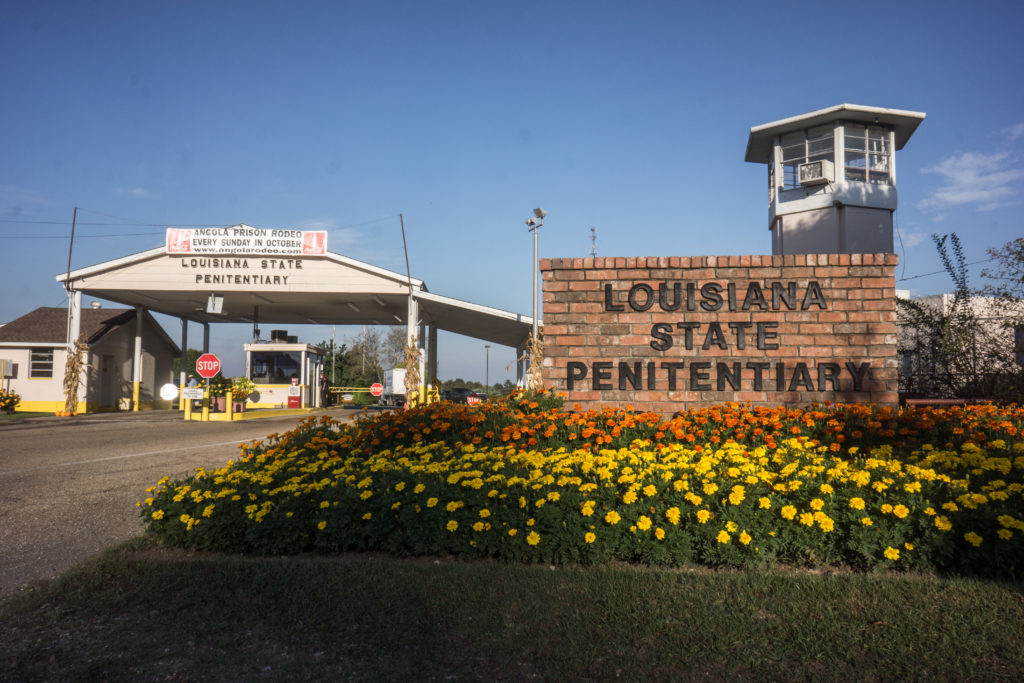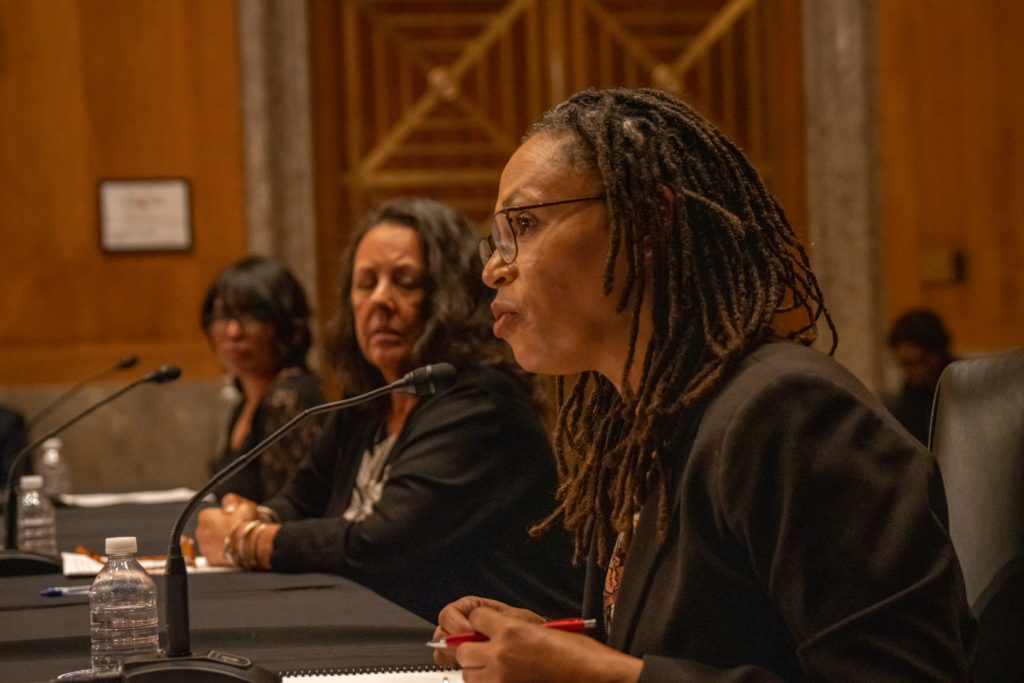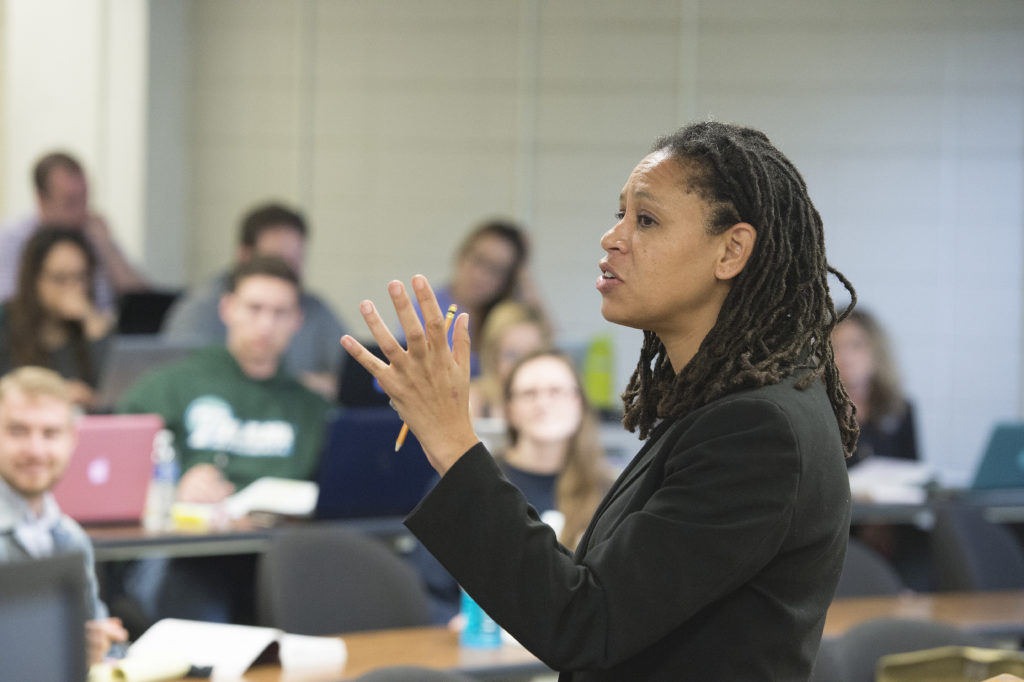NEW ORLEANS — Andrea Armstrong has spent countless hours at the Louisiana State Penitentiary.
She has not been convicted of a crime; for years, the Loyola University of New Orleans law school professor has visited prisons and jails to document the deaths of incarcerated people and draw attention to the dehumanizing conditions of confinement.
As a result of that work, Armstrong has become a leading expert whose research sheds light on the harmful conditions people behind bars face in the United States. In October, she was named to the 2023 class of MacArthur fellows, often known as recipients of the prestigious “genius grants.”
WATCH: Incarcerated people face heightened costs to communicate with families
As a young girl, Armstrong went to public school in New Orleans, a city with heavy policing and a high arrest rate. At the Louisiana State Penitentiary, better known as Angola, the nation’s largest maximum-security prison, she has witnessed and documented abuse of people serving time. A former slave plantation, the 18,000-acre site holds more than 6,300 incarcerated people. But shadows of its past are everywhere, Armstrong said.
“It still looks and feels like a plantation,” she said. “As you drive up, you look and see rows of Black bodies bent over in the fields and a guard on horseback with a rifle keeping guard. It looks very much the same as it did pre-Civil War.”

The entrance to Louisiana State Penitentiary, also known as Angola, a maximum-security prison named after the former plantation that occupied this area. Photo by Giles Clarke/Getty Images
The road to becoming a “genius” has meant hearing hundreds of stories of how people are treated once convicted or awaiting trial in Louisiana, which has the highest per-capita incarceration rate in the country as well as the highest in-prison mortality rate. Armstrong authored a report that documented a nearly 50 percent increase in deaths from 2019 to 2021 in the state’s prisons, jails, and juvenile detention centers.
Listening to imprisoned people and their families has changed her understanding of punishment. It is difficult work, but not the “24-hour-a-day, seven-day-a-week experience of these facilities” that people who are incarcerated endure.
“The point is not to just understand them. The point is to fix these problematic conditions that hurt and harm people,” she said, adding that these practices hurt those who are incarcerated, the staff who work in those facilities, and anybody connected to both of those groups. It hurts the communities. “That first-hand knowledge is essential if prevention is really the goal.”
Armstrong, who is also the chair of the Prison and Jail Innovation Lab at the LBJ School of Public Affairs, has also surveyed prison and jail conditions outside of Louisiana, which she said are not just brutal but deadly and mostly unreported.
“The punishment is just supposed to be that you are removed from society for a certain amount of time, which is significant. I don’t think anyone with a straight face would say that you should be victimized while you’re incarcerated, either physically assaulted, sexually assaulted, et cetera. That is never an appropriate punishment for the state to impose on another individual,” Armstrong said. “You should not be denied the basic necessities of being a human being, which include nutritious food, access to sunlight, and clean drinking water.”
In September, men imprisoned at Angola filed a class-action lawsuit decrying work conditions as cruel and often dangerous, including working in the prison’s fields for little or no pay in 100-plus degree temperatures.
A U.S. district judge condemned the prison in 2021, saying access to medical care was unconstitutionally inadequate and deaths of incarcerated people are the result of “overwhelming deficiencies.”
The Justice Department said in a scathing report in January that Louisiana’s corrections department “routinely confines” thousands of inmates beyond their release dates each year, in violation of the U.S. Constitution.
“When we think about prisons and jails, it is the place where governments have an enormous amount of authority and power and individuals have the least amount of power and agency, and it’s between those two spaces that we often see some pretty horrendous things happen. And within that gap, that is where abuse occurs,” Armstrong said. “So the Constitution operates one way for you and for me, but when you’re behind bars, it operates completely differently.”
The New Orleans native brought her findings to Congress last year, urging lawmakers to use its range of available tools to help improve transparency and accuracy around reporting prison deaths and conditions. As an academic researcher, she told a Senate subcommittee that she stands ready to support as needed.
“What the United States is allowing to happen on our watch in prisons, jails, and detention centers nationwide is a moral disgrace,” Committee Chairman Sen. Jon Ossoff said during the hearing.

Andrea Armstrong, a national expert on prison and jail conditions, testifies in September 2022 at a U.S. Senate hearing investigating “Uncounted Deaths in America’s Prisons and Jails.” Armstrong said the federal government should be adamant in collecting information on deaths in these facilities across the country. Photo courtesy of Sen. Jon Ossoff’s office
Mercedes Montagnes, the former executive director of The Promise of Justice Initiative, a group that seeks to expose prosecutorial misconduct and improve prison conditions, described Armstrong as a “force” in the community.
“To see someone who has put their head down and do the work get this kind of recognition was amazing,” Montagnes said. “She has been a connector, linking the litigation, academic, and activist world to work towards a more just state. She keeps going despite closed doors. We need leaders who can imagine beyond the walls that have been put up in front of them.”
Armstrong is among 20 MacArthur fellows for 2023, who each received a no-strings-attached grant of $800,000 over five years from the John D. and Catherine T. MacArthur Foundation. This year’s recipients, including artists, legal scholars, activists, and scientists who study everything from prisons to poetry to the airborne transmission of diseases, can spend the money however they choose.
Armstrong plans to use the money to support her work with law students and community organizations to publicly share data and research through the Deaths Behind Bars in Louisiana project and its website, Incarceration Transparency.
She hopes the money and prestigious award open a path to accountability that stretches from the jailhouse to the jury room.
“I don’t believe that a jury that is hearing charges and votes to convict is also considering the fact that a person may be denied health care for the duration of their prison sentence, that they are also voting for a person to receive meals that aren’t healthy or that are infested with vermin,’” Armstrong said. “Too often, the how and why a person in prison dies is often kept secret from everyone, including the person’s family. People are so much more than their worst moment.”
Armstrong said the MacArthur “genius grant” will allow her to “just dream bigger and deeper than I really ever had before.”
Video by MacArthur Foundation
“Most of the stuff that we’ve done, we’ve put together with elbow grease and some duct tape, and people just kind of stepping up,” she added.
Armstrong stepped up in 2015 for Linda Franks, when her son, Lamar Alexander Johnson, was pulled over during a traffic stop for a tinted windows violation. Days later, he was discovered dead inside his cell at the East Baton Rouge Parish jail, before he had a court date.
Lamar’s death was one of the 25 detailed in a 2018 report on fatalities at the East Baton Rouge Parish Prison, which Armstrong called “one of the deadliest jails in the country.”
The report’s data was collected after parents like Franks asked, “Is my son the only one to die this way?” The report played a vital role in amplifying the calls for reform from prisoner rights advocates across the state.
“[Armstrong’s] ability to analyze, describe, and explain the complexities of this system is incredible — and equally incredible is her compassion for the lives and the families of the lost,” said Franks, who is a founding member of the East Baton Rouge Parish Prison Reform Coalition. “She is the light that shone in a dark, dark place.”
Stories of injustice and death
Nearly 2 million people in the U.S. are incarcerated, a 500 percent increase over the last 40 years, according to the Sentencing Project. A disproportionate number of those incarcerated are Black.
Louisiana, often dubbed the “Incarceration Capital of the World,“ has 55,000 people behind bars. At 66 percent, Black people are overrepresented in the state’s incarcerated prison population, nearly double the rate of white people.
While Armstrong has met with powerful members of Congress, governors, activists, lawyers and stood before judges, none have been more powerful in shaping her worldview and professional agenda than incarcerated people.
None of the 1,168 people who died while incarcerated in Louisiana from 2015 to 2021 were sentenced to death, according to Armstrong’s work, but little is known about the end of most of their lives.
Armstrong said her scholarship stems from a single question from someone incarcerated in Angola.
“It was somebody I was visiting who had actually just got off of death row and was being forced to work. He was put in the fields. He looked at me, and he asked, ‘Why do they get to make me a slave again?’” Armstrong said. “I couldn’t answer him. And so I said, ‘That’s a really good question. Let me go do some research and figure that out.’”
Her search for answers led her to write a law review published in 2012, titled Slavery Revisited in Penal Plantation Labor. She found that the 13th Amendment exception — which bans enslavement or involuntary servitude except as a form of criminal punishment — is not as broad as it appears. She argued that society “must critically examine the types of labor we require our inmates to perform and prohibit the imposition of slavery, even when the enslaved is an inmate.”
Forcing a “slave status” onto imprisoned people “undermines society’s trust and faith in our criminal justice system and ultimately lessens the government’s ability to protect society,” Armstrong concluded.
The MacArthur Foundation noted how Armstrong’s work deepened the scholarship around the racial dimensions of labor practices, disciplinary actions, and health care in prisons.
Norris Henderson is not only glad to have Armstrong as a fixture in the community, but also as a board member for his advocacy group, VOTE or Voice of the Experienced. It is a grassroots organization founded and run by formerly incarcerated people.
“Nobody can question her credentials,” said Henderson, founder and executive director of VOTE. “It’s very rare that people in academia make themselves available to just everyday people in the community. She puts herself on equal footing with you.”
Armstrong’s work helped the statewide push to restore the voting rights of formerly incarcerated people in Louisiana and to confront those in power with research that identified patterns in deaths behind bars. That data, Armstrong argued, may be indicative of broader challenges for the safe, secure, and humane operation of prisons, jails, and detention centers.
READ MORE: Why deaths in Louisiana prisons are on the rise
She also worked with VOTE on efforts to pass a constitutional amendment that requires unanimous agreement among jurors to convict people charged with felonies. Previously, the state only required 10 of 12 jurors to agree. The amendment passed in 2018, reversing a long-held practice that among other consequences made it easier for non-unanimous juries to convict Black people.
“Most folks in academia don’t take those kinds of risks,” Henderson said. “Not everybody appreciated her peeling the onion back the way she did, but she told this story that connected the dots between these anecdotal stories that people were telling. She brought the data to back it all up.”
The story of Glenn Ford, who was wrongfully convicted of a 1983 murder and served nearly 30 years on death row in solitary confinement, has stayed with Armstrong, too.
Ford was exonerated in 2014, but shortly after his release from Angola, he was diagnosed with Stage 3 lung cancer. It quickly progressed to Stage 4. Ford died in 2015 at the age of 65.
Armstrong said Ford told her about the horrible conditions he faced, including choking on smoke from a burn dump outside of his cell window, smelling raw sewage that ran beneath his cell, and cleaning with provided chemicals that made the paint bubble.
For her, Ford stands as a symbol of injustice in Louisiana prisons because he was not only denied his constitutional rights, but was not given the same protections as others on the outside, especially those afforded by environmental, housing, and workplace laws.
Ford’s story “really opened my eyes,” Armstrong said.
“The only place he was allowed to go to was essentially what he described as a dog kennel, and he refused to be treated like a dog,” she said. “He talked about the lack of health care and that the only thing that was available to him while he was incarcerated was Tylenol.”
Ford lived free for about 15 months. Armstrong said he tried enjoying as much of his new freedom as he could, “but at the end of the day, he still thought that death row killed him.”
If he had proper access to health care, for instance, the cancer may have been discovered earlier when it was more treatable.
Not everyone gets out. More than 90 percent of the people who are convicted and sent to Angola will die on the premises, according to a 2015 report from the American Civil Liberties Union. Many are buried in the graveyard on the prison’s grounds. In recent years the Louisiana Department of Corrections has tried to improve health outcomes by providing more localized health care with on-site clinics, specialized programs for substance use at state facilities for higher-needs populations, and full-health assessments once a person is convicted.

Loyola University New Orleans law professor Andrea Armstrong speaks to students in class. The students are an integral part of the “Incarceration Transparency” project, which focuses on collecting and analyzing deaths of people behind bars in Louisiana with the help of Loyola law students for public use. Photo by Kyle Encar/Loyola University New Orleans
For colleagues in Armstrong’s orbit, the MacArthur recognition could help expand the conversation further for those working in the same space.
Madeleine Landrieu, dean of Loyola University New Orleans College of Law, said students have come to the institution because they’ve followed Armstrong’s work.
“Many people want to be part of something that actually moved the needle,” she said. “For them to see her work recognized and see it making a transformational change, it’s pretty powerful. What she’s doing is training a group of future leaders to think about things in a new way.”
Armstrong credits her mom as being her best mentor. saying that service was always a part of their lives. Her mother instilled the meaning of service by going to church and serving food to the less fortunate. As a child, Armstrong played pickup basketball at the local orphanage and collected clothes for homeless shelters.
“I was raised that way and I get that from her,” Armstrong said, adding that she believes in mentorship because it changed my life.
“There are individual people who opened incredibly amazing experiences and worlds to me, worlds that I didn’t even know existed until they talked to me,” she said.
Armstrong hopes to pass the family trait to her own two kids as well as to her law students, and future generations who can all work toward a more just world. Community meetings, protests, and hearings are an everyday part of her kids’ lives.
“They are used to my kitchen table sometimes becoming the legal aid office of the neighborhood,” Armstrong said. “I hope that they also grow up to see service as part of their responsibility even if it is not their job.”
The John D. and Catherine T. MacArthur Foundation, which runs the MacArthur Fellows program and distributes the “genius grants,” is also a funder of the PBS NewsHour.
This post was originally published on this site be sure to check out more of their content.








